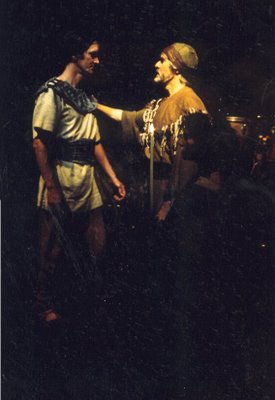
In Beowulf there seems to be a constant tension between the past upon which the author dwells and the present of the society for whom he writes. This happens because the author, most likely a monk, continuously attempts to Christianize the pagan story that he narrates. Most Contemporary readers would think that this challenge is one that the author (working with a text from a pagan oral tradition) never solves. This conflict, contemporary readers will think, is not handled in a proper Christian way, and, at stages, 21st Century readers dismiss the author’s endeavours as futile and naïf. Nevertheless, contemporary readers should not be to prompt in stating the futility of the so called Christianization of the pagan epic. In fact, one must admit that all concepts change in time, and that that applies to the concept of Christianity also. In the millennia since he walked on earth, the representation of Christ went through several paradigmatic shifts; the most recent one being the departure from the Old Testament in favour of the New Testament. The same is to say that the mode in which the image of Christ has been perceived was both seriously influenced by men and, in turn, influenced the ways in which humanity perceives God.
Written some 1200 years ago, Beowulf, for its contemporary audience, would most likely sound truly Christian in spirit. It was not before the 19th Century that Christians themselves begun to attach more importance to the New Testament and, increasingly, less to the Old Testament. When Beowulf was written, not only the Old Testament would be considered almost as important as the New, but in addition Christianity was extremely recent to England, and the actual process of bringing Anglo-Saxons into Christ was, somehow, made more of a blending between Christian values and pagan imagery, than of a shift from pagan beliefs to Christian values: “One must, indeed, draw the conclusion from the poem itself that while Christian is the correct term for the religion of the poet and of his audience, it was a Christianity that had not yet by any means succeeded in obliterating an older tradition.” (Norton: 26).
Throughout the poem, the book of Genesis serves as a touchstone. And this does not happen merely because it would be (almost) impossible to fit the revolutionary ideology of the New Testament into the text. It happens because the Old Testament is in many ways an epic story full of maddening and barbaric episodes. Moreover, the Old Testament related much more to Anglo-Saxon traditions than the New Testament ever could. Christian readers today tend to forget that the Old Testament is full of infuriating episodes, like when Abraham is ready to assassinate his own son just in order to prove his faith to God. Or the gory stories about the end of the World, and the vivid descriptions of the Devil and his demons. Contemporary Christianity focus almost entirely on The New Testament, or when it turns to the Old Testament it carefully selects the positive bits and ignores the massive bulk of negative ones.
Although this is mere speculation, one must not assume that when Beowulf was written the Old Testament was not as important (possibly even more important) than the New Testament. And that the Christianity of those days was a bit different from ours. Nevertheless they were still Christians, because they believe in God, the Holly Trinity and so forth all the way to Hell and the Devil.
II Christian Justice?
In several Greek tragedies, namely the Oresteia by Aeschylus, justice is served, again and again, in the form of revenge. It is the well known formula: you kill my father, I kill you, your brother kills me, and my son kills your brother, until the end of the world. This formula is also present in Beowulf. The society of Beowulf is defined in terms of kinship. When a relative is killed it was the sworn duty of the surviving relatives to exact revenge upon the killer, either with his own life or with weregild, a sum in gold. Beowulf’s own existence derives from this fact: when his father Ecgtheow was banished for killing Heatholaf, he sought sanctuary at the court of Hrothgar. The latter subsequently paid the weregild, and Beowulf’s father was from then on indebted to the king. Beowulf himself says at a given time to Hrothgar: “It is better for a man to avenge his friend than much mourn”.
Hence, the hero travels to kill the monster that is causing trouble to Hrothgar. Consequently, the monster’s mother wants to exert revenge and Beowulf has to kill or be killed. Now in the Orestia, Aeschylus brilliantly solves this problem by introducing the Polis as the proper judge for Human disputes. Private retribution is no longer admitted; the wrong doings of individuals are to be scrutinized by society, the rule of law substitutes the rule of revenge. The important thing here is that Aeschylus was not a Christian and so he could opt for such an enlightened and visionary solution. Beowulf, on the other hand, follows more in the line of the biblical tradition: “Exodus 21:22 If men strive, and hurt a woman with child, so that her fruit depart from her, and yet no mischief follow: he shall be surely punished, according as the woman's husband will lay upon him; and he shall pay as the judges determine. 23 And if any mischief follow, then thou shalt give life for life, 24 Eye for eye, tooth for tooth, hand for hand, foot for foot, 25 Burning for burning, wound for wound, stripe for stripe.”
Old Testament provisions when it came to Justice do not end here: “Leviticus 24:18 And he that killeth a beast shall make it good; beast for beast.19 And if a man cause a blemish in his neighbour; as he hath done, so shall it be done to him; 20 Breach for breach, eye for eye, tooth for tooth: as he hath caused a blemish in a man, so shall it be done to him again.21 And he that killeth a beast, he shall restore it: and he that killeth a man, he shall be put to death”. More examples could be procured, but these, combined with what already has been said of the Anglo-Saxon society, suffice in supporting the argument.
Contemporary readers claim, because references for the New Testament are not made in Beowulf, the tension between Christian and pagan values is never fully solved. This seems almost self-evident: Christ’s message is (mainly) one of tolerance and good will. Nevertheless, again in this case, modern readers should not be so selective when reflecting on the lack of Christian values in Beowulf. It is a fact that there are no references to the New Testament, but at least one could have been made:"Ye serpents, ye generation of vipers, how can ye escape the damnation of hell?" (Matthew 23:33) – Jesus addressing people who did not like his preaching. It seems evident that the author of Beowulf is faced with a problem: he has in his hands a story full of revenge.
What does he do to Christianize his story? He turns to the bible, being as much selective as modern Christian readers who go away from the bad parts and concentrate on the good ones. The problem is, modern readers at large (in The West, at least) will accept what modern Christian readers say is Christianity.
III Boasting
One is forced to agree that at stages there seems to be a difficulty in the process of merging the epic past with the author’s present. One of the best examples for this would have to be the presence of boasting in the poem. Here, modern readers think they see the ultimate contradiction between Christian and pagan principles. They will look at Beowulf and say: how un-Christian to be always boasting and boasting. They will have in mind “Mean-spirited ambition isn't wisdom. Boasting that you are wise isn't wisdom. Twisting the truth to make yourselves sound wise isn't wisdom. (James 3:14). Or, more to the point: “Don't dare talk pretentiously- not a word of boasting, ever! For GOD knows what's going on. He takes the measure of everything that happens”. (Samuel 2:3).
However, they are wrong. Boasting in Beowulf is not to do with pride, in the colloquial sense of look at how marvellous I am, I kill all these monsters; it is to do with honour and promises. When a warrior boasted, what he was actually doing was making a promise, a public vow. Therefore, when Beowulf boasts that he will kill Grendel, what he is in reality doing is committing himself to that task in front of an audience. The crux of boasting was that after the boast there was no turning back; either mission accomplished or die. If a warrior conducted himself in this fashion, wining or losing, he would be talked about and praised. If he did not, he would not be respected any more. He would become a motif of scorn and his name for ever synonym of shame. However, some might point out that, if so, why does Beowulf boasts so lengthy about his aquatic challenge with Breca? Again, here Beowulf is not boasting at all, he is merely setting the record straight. For his honour, he could not let Unferth’s accusations fly. In fact, if there is something more to add about boasting, the words of Beowulf are enough: “Like boys we agreed together and boasted – we were both in our first youth”.
IV Conclusion
In this analysis I have tried to highlight how easy it is not to understand a text. Texts have multiple interpretations; besides, the older a text is, the more the difficult it is to “read” its meanings. This happens because we just do not know much about the context in which the text was written. In the case of Beowulf, I was mainly interested in refuting contemporary interpretations that it is not, in essence, a Christian text. Of course, I would be a genius if I had really achieved success in this task. In conclusion, is Beowulf a story about Christians fighting evil, or is it a pagan epic? It is both and it is neither. Alas, the synthesis is never fully possible. The same happens to man: Beowulf is poem about man, about man’s qualities and about man’s faults, imperfections. That is why, in the pressing matter of Christianity and Beowulf, we can never be truly sure. Beowulf is not to do about Christianity it is to do about man. And so I, an immodest reader back in the 21st Century, say to the author of Beowulf: I salute thee! Thou are a more intelligent and wise man than I will ever be.
Bibliography
The Norton anthology of English literature, M.H. Abrams, general editor. - Vol.1, 4th ed, New York.
Tolkien, J.R.R. The Monsters and the Critics, in “The Beowulf Poet” Fry, D.K, editor, Prentice –Hall, Inc., Englewood Cliffs.
Se ainda não leram o poema Beowulf, e se estiverem interessados, podem encontrar uma versão de um dos maiores poemas épicos aqui.










|